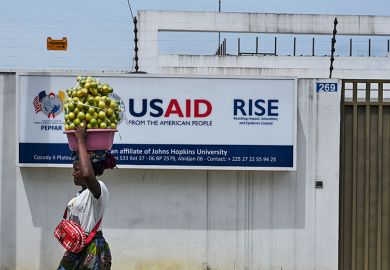Browse the full Impact Rankings 2021 results
A UK university has topped the Times Higher Education Impact Rankings for the first time amid a broader trend of improvement for the nation, but there are concerns that this could be undermined by cuts to research funding.
The University of Manchester leads the overall THE Impact Rankings 2021, which uses metrics based on the United Nations’ Sustainable Development Goals (SDGs), while four other UK universities feature in the top 20: King’s College London (11th), Newcastle University (15th), the University of Leeds (16th) and the University of Leicester (19th). Eleven UK institutions make the top 50, up from nine last year.
The UK also tops three of the 17 tables on individual SDGs; it led only one last year. Manchester leads the lists on SDGs 11 (sustainable cities and communities) and 12 (responsible consumption and production), while the University of Plymouth tops 14 (life below water).
THE Impact Rankings 2021: the top 10
| 2021 rank | Institution | Country/region | Score |
| 1 | University of Manchester | United Kingdom | 98.8 |
| 2 | University of Sydney | Australia | 97.9 |
| 3 | RMIT University | Australia | 97.8 |
| 4 | La Trobe University | Australia | 97.3 |
| 5 | Queen’s University | Canada | 97.0 |
| =6 | University of Wollongong | Australia | 96.1 |
| =6 | Aalborg University | Denmark | 96.1 |
| 8 | University College Cork | Republic of Ireland | 96.0 |
| =9 | Arizona State University (Tempe) | United States | 95.8 |
| =9 | University of Auckland | New Zealand | 95.8 |
Analysis of countries’ average performance across the 2021 Impact Rankings reveals that the UK is part of a golden triangle of nations that perform well across the board, alongside Australia and Canada. The UK is among the top three countries, based on median score, for 11 of the 18 tables (including the overall ranking) and is number one in two of them: SDG 10 (reduced inequalities) and SDG 16 (when only countries that had 10 or more ranked institutions in 2020 and 2021 were included). Meanwhile, six of the top 10 places in the table on SDG 12 are filled by UK universities.
However, Australia still dominates the top of the overall ranking, claiming four of the top 10 places.
Part of the UK’s improvement is driven by its increased representation, with 52 institutions participating this year, up from 35 in 2020. But most of the 98 countries/regions featured have seen a significant rise in participation, with the 2021 rankings including 1,240 institutions, up from 859 last year.
THE Campus Spotlight: Educating towards the Sustainable Development Goals
Dame Nancy Rothwell, Manchester’s president and vice-chancellor, said that the institution had “placed social responsibility as one of our core goals for the past decade”.
Julian Skyrme, the university’s director of social responsibility, attributed Manchester’s success in the ranking to the fact that it was performing well in terms of impact across all four areas underpinning the methodology: research, stewardship, outreach and teaching.
“Obviously we’re really pleased to be first, but we’re more pleased to be part of a movement of universities around the world that have been increasingly prioritising their social and environmental impact and trying to think about what we’re good for, rather than just what we’re good at,” he added.
On the UK’s performance more broadly, Dr Skyrme said that the country was “clearly punching above [its] weight”.
“British universities have been really good at recognising that a key way in which they serve their societies is by addressing these big goals that exist outside our organisations,” he said, adding that their achievement in the ranking “bodes well for furthering the UK’s role in the world in creating partnerships to develop new knowledge for some of these critical challenges”.
It also “sends a strong message globally that Britain is a place where you can come to study and learn about how to address those big challenges”, he said.
Zoe Robinson, professor of sustainability in higher education at Keele University, said it was “not a great surprise” that the UK was performing well in the Impact Rankings “because there is a long history of a small number of universities trying to drive the sustainability agenda in quite a holistic way”. Meanwhile, some of the metrics would now be considered “just good practice” in the UK, such as public access to facilities or engagement in outreach, she added.
Professor Robinson said that this strong performance was likely to provide a boost for the sector in other areas, such as recruitment and research.
“At Keele, we have recruited a number of staff at quite a high level who have been attracted specifically to our institution because of our sustainability ethos. What that then leads to is potential for really interesting interdisciplinary collaborations,” she said.
But Professor Robinson suggested that there was a risk that the UK’s future performance in the Impact Rankings could be under threat as a result of the government’s cuts to research funding from overseas aid.
“I wonder whether there is a role within the Impact Rankings to highlight what we might be losing there,” she said.
Judith Petts, Plymouth’s vice-chancellor and head of a climate commission for higher and further education at Universities UK, agreed that the UK’s “huge experience of leading large-scale and interdisciplinary projects on important sustainability topics around the world” was “being challenged” by the government funding cuts.
“We would be foolish to think it would completely negate future efforts. But we have to be aware that what it’s doing is stopping current partnerships with people overseas who may lose trust [in the UK],” she said.
On Plymouth’s leading performance on SDG 14, Professor Petts highlighted the institution’s history as a navigation training college and “continued investment” in marine research and teaching.
“The whole problem of marine microplastics was first defined by one of our senior colleagues, Professor Richard Thompson, 20 years ago,” she said.
ellie.bothwell@timeshighereducation.com
Top universities by SDG
SDG 1 – No poverty
Queen’s University (Canada)
Research on poverty and support for students from poor families
SDG 2 – Zero hunger
Metropolitan Autonomous University (Mexico)
Research on hunger, teaching on food sustainability and commitment to tackling food waste and hunger on campus and locally
SDG 3 – Good health and well-being
Oregon Health and Science University (US)
Research on key diseases and conditions, support for healthcare professions, and health of students and staff
SDG 4 – Quality education
Aalborg University (Denmark)
Contributions to early years and lifelong learning and commitment to inclusive education
SDG 5 – Gender equality
Princess Nourah bint Abdulrahman University (Saudi Arabia)
Research and policies on gender equality and commitment to recruiting and promoting women
SDG 6 – Clean water and sanitation
University of Sydney (Australia)
Research related to water, water usage and commitment to ensuring good water management in wider community
SDG 7 – Affordable and clean energy
King Mongkut’s University of Technology Thonburi (Thailand)
Energy research, energy use and policies, and commitment to promoting energy efficiency
SDG 8 – Decent work and economic growth
University of Johannesburg (South Africa)
Economics research, employment practices and share of students taking work placements
SDG 9 – Industry, innovation and infrastructure
University of British Columbia (Canada), Delft University of Technology (Netherlands), Technical University of Munich (Germany) and University of Toronto (Canada)
Research on industry and innovation, number of patents and spin-off companies and research income from industry
SDG 10 – Reduced inequalities
University of Canberra (Australia)
Research on social inequalities, policies on discrimination and commitment to recruiting staff and students from under-represented groups
SDG 11 – Sustainable cities and communities
University of Manchester (UK)
Research on sustainability, role as custodians of arts and heritage and internal approaches to sustainability
SDG 12 – Responsible consumption and production
University of Manchester (UK)
Research on responsible consumption and approach to the sustainable use of resources
SDG 13 – Climate action
University at Buffalo (US)
Research on climate change, use of energy and preparations for dealing with consequences of climate change
SDG 14 – Life below water
University of Plymouth (UK)
Research on life below water and education on and support for aquatic ecosystems
SDG 15 – Life on land
La Trobe University (Australia)
Research on life on land and education on and support for land ecosystems
SDG 16 – Peace, justice and strong institutions
Queen’s University (Canada)
Research on peace and justice, participation as advisers for government and policies on academic freedom
SDG 17 – Partnerships for the goals
University of Newcastle (Australia)
The broader ways in which universities support the SDGs through collaboration with other countries, promotion of best practices and publication of data
Methodology
The THE Impact Rankings include metrics based on all 17 of the UN Sustainable Development Goals across four broad areas: research, stewardship, outreach and teaching.
Universities can submit data on as many of the SDGs as they are able. SDG 17 is the only compulsory SDG for inclusion in the overall table.
A university’s final score in the overall table is calculated by combining its score in SDG 17 with its top three scores out of the remaining 16 SDGs. SDG 17 accounts for 22 per cent of the overall score, while the other SDGs each carry a weighting of 26 per cent. This means that different universities are scored based on a different set of SDGs, depending on their focus.
The score from each SDG is scaled so that the highest score in each SDG in the overall calculation is 100 and the lowest score is 0.
Universities must submit their own institutional data to be ranked. Bibliometric data come from Elsevier.
POSTSCRIPT:
Print headline: UK excels in social and economic impact – but threats loom
Register to continue
Why register?
- Registration is free and only takes a moment
- Once registered, you can read 3 articles a month
- Sign up for our newsletter
Subscribe
Or subscribe for unlimited access to:
- Unlimited access to news, views, insights & reviews
- Digital editions
- Digital access to THE’s university and college rankings analysis
Already registered or a current subscriber?














